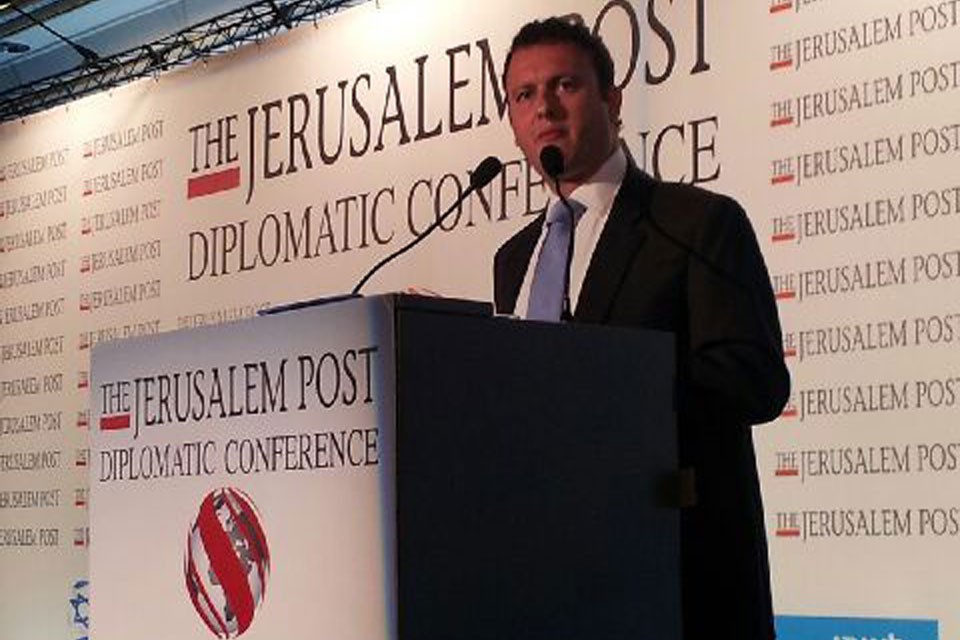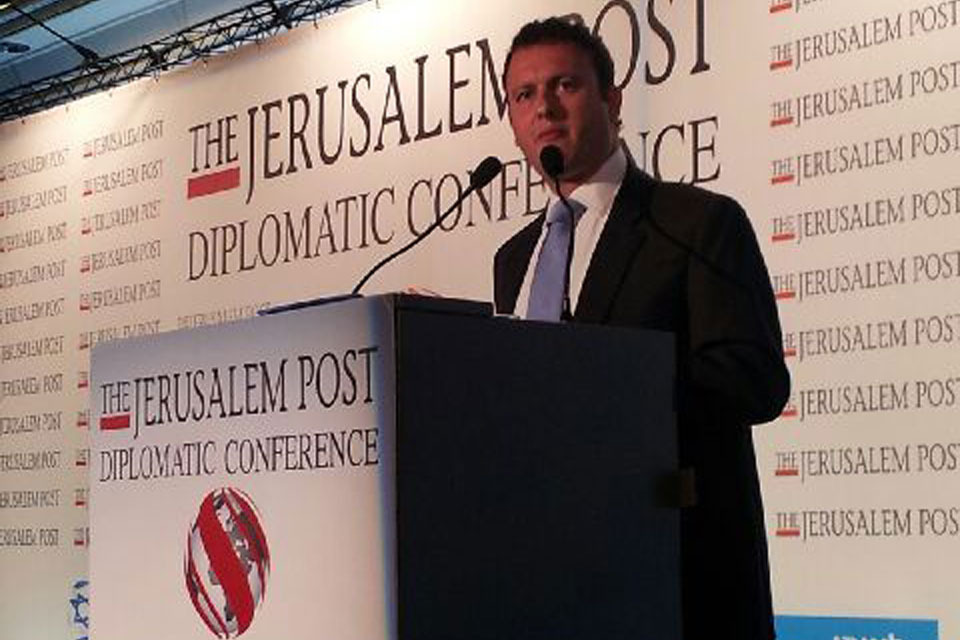British Ambassador to Israel speaks in annual JPost diplomatic conference
Ambassador Gould: UK is not blind to the Iranian threat

Your Excellencies, ladies and gentlemen, it is a pleasure to be invited to speak at this conference, in the presence of so many distinguished guests. Like every Anglo who comes to live in Israel, I have come to know and love the Post.
When President Obama was here earlier in the year, he said ‘atem lo levad’ – Israel is not alone. Today, in the presence of so many of my colleagues and friends from around the world, I want to underline this message, particularly in the context of the question that now dominates discussion of Israel’s security – the question of Iran’s nuclear programme.

British Ambassador to Israel, Matthew Gould
I want to address two aspects of the nuclear question in particular. The first is reassurance. To say as clearly as I can that when it comes down to the question of how to deal with the programme, we are not going to do a Bad Deal. Nor will we stand by as the Iranians continue to develop the capability to build nuclear weapons
The second is opportunity. To emphasise that despite all the risks, we have a small window of opportunity to test whether there can be a negotiated solution or not. The Iranians have shown a more positive approach in recent weeks, and the only way to find out if that is for real is to test it in negotiations. If the Iranians are genuine, there is an opportunity to prevent the proliferation of nuclear weapons in one of world’s most unpredictable regions.
But first I want to address head on an elephant in the room, or at the very least an elephant that has been sitting in my room: namely the British parliament’s vote against military action in Syria. I can’t stand here and pretend that vote is not relevant to how Israel sees the issue of Iran.
Israeli friends tell me that recent weeks have been confusing. Military action on Syria was imminent; then it was on hold. President Rouhani presented a dramatically more reasonable face of Iran to the world than his predecessor. Israel, my friends tell me, is wondering whether the world is serious about stopping Iran from getting the bomb.
Reassurance
I am here with a simple message: it is in these challenging moments that Israel can take comfort that there are countries that will never compromise on Israel’s security. Britain is one of those countries. Others are represented here today.
More than that, Iran is not just Israel’s problem. Iran’s nuclear ambitions and its support for terrorism present a threat to the region and the world. Right now, Iran remains in breach of six UN Security Council Resolutions.
These are not issues between Iran and Israel, they are issues between Iran and the world. And so it would be neither right nor wise for Israel to chart its way forward on the issue as if it were alone.
Yet Israeli friends have told me that they were surprised by the British Parliament’s vote against military action on Syria. They fear it showed that even Israel’s closest allies cannot be relied upon, and that Israel must defend itself alone.
I can understand why Israelis have come to this conclusion. But I believe firmly that this conclusion is wrong. Israel is not alone, and the British Parliament’s vote on Syria should not be taken as evidence of a lack of resolve on Iran.
Iran is a very different issue from Syria. We are clear that a nuclear armed Iran would jump start a regional nuclear arms race that would threaten not only Israel but the world. That is why we have led the world with some of the most stringent financial sanctions on Iran. It is why we have placed such a high value on our cooperation with Israel against Iran’s nuclear programme.
The Iranians could not be more wrong if they mistake our commitment to Parliamentary democracy for weakness. We have made clear that while we welcome the positive tone from Iran’s President Rouhani we remain clear eyed about the need to see real action from Iran on its nuclear programme. President Rouhani should know that our determination to prevent Iran from obtaining a nuclear weapons programme is as strong as ever. And all should know that our commitment to Israel’s security is unbreakable.
Diplomats and policy makers sometimes talk glibly about security, as if it were just a heading for policy papers. I know that for every Israeli, it is very real. It is the difference between having confidence in the future and not, between life and death.
And Prime Minister Netanyahu, Prime Minister Cameron, and President Obama are all clear: a nuclear armed Iran is a grave to Israel’s security.
Iran’s programme goes far beyond the requirements of a civilian nuclear programme. Since 2012 Iran has installed thousands more centrifuges, including the more advanced IR2M centrifuges. The regime has expanded its stockpile of 20% enriched uranium and has continued work on the Heavy Water Research Reactor at Arak.
No one can be in doubt how seriously we take the threat of a nuclear armed Iran. We and our allies imposed one of the most far-reaching sanctions regimes ever adopted, which has had a huge impact on the Iranian economy.
Eleven years ago, I was living in Iran, as Britain’s Deputy Ambassador. I dealt daily with the Iranian regime. One of the key lessons from my time there is that the Iranian regime knows its economy is a huge vulnerability. It is inefficient, corrupt, badly managed and has tens of millions of people directly or indirectly on the government payroll. Without the regime’s oil income, it’s in trouble.
That’s why the sanctions are working. The rial has collapsed in value. Unemployment is high. Inflation is rampant. The official inflation rate of 28% is an illusion; the true figure is double that. The cost of doing business with Iran has gone up dramatically. Iran’s ability to sell its own oil has been curtailed by international sanctions that make it almost impossible to conduct financial transactions with Iran. Iran is not getting the technology it needs to sustain its own oil production, and production is down 45%, costing the Iranian exchequer over $40 billion a year. The reserves of the Iranian regime are shrinking fast.
This explains the change in the Iranian tone - why have we witnessed such a marked change in their rhetoric. Because the government is under unprecedented pressure due to the sanctions.
The Iranian Government also know that there is a simple way to bring sanctions to an end. By giving the international community the confidence it needs that Iran is not developing and will not develop a nuclear weapon.
Opportunity
Diplomatic success often follows a readiness to use hard power. The reason that Iran is now at the negotiating table is because we have imposed and maintained some of the toughest sanctions in modern times. And last week in Geneva we saw a new tone in the negotiations - for the first time an apparent willingness to negotiate rather than simply to talk.
But I understand the scepticism in Israel – and not just in Israel – about the new positive tone from Iran. After all, the centrifuges are still spinning. To succeed, conciliatory words will have to be matched by the right actions, and they will need to be transparent and verifiable. After all, it is the Iranian government’s choices alone that have led to the comprehensive sanctions that are currently in place, and it is those choices that need to change if the sanctions are to be lifted.
So I want to be absolutely clear: while the centrifuges are spinning, while inspectors are denied full and free access to nuclear sites, while there is any sense that Iran is prevaricating or reneging on any commitments, we will continue to maintain strong sanctions. As William Hague has made clear, while we welcome the positive tone and do not want to waste a possible opportunity, a substantial change in British or Western policies on the Iranian nuclear programme requires a substantive change in that programme. We need to be crystal clear as we go into this negotiation.
We are not naive. We have ample experience of dealing with the Iranian regime and go into this with our eyes open.
As we take part in these negotiations we will keep clear in our minds one thing above all others – the infrastructure of Iran’s nuclear programme, how many centrifuges they have, and how long it would take them to develop a bomb.
We will neither rush nor tarry. Iran’s nuclear programme marches on, and as more centrifuges get installed so it becomes harder to negotiate a solution that gives us all sufficient reassurance. The clock is ticking.
But the clock is not at zero. And it is far from clear than time is working against us. The leaders of Iran are watching their economy crumble, their unemployment grow, their factories shut, their reserves shrink. They know that if these talks do not go somewhere in a sensible timeframe we will be bringing in the next, even tougher round of sanctions.
We are all in favour of resolving this issue through negotiations rather than through military means. The question is whether such a negotiated outcome is possible – whether the rulers of Iran are willing to make take the concrete, verifiable steps needed for us to have confidence that they cannot develop nuclear weapons quickly. We hope that negotiations will lead to concrete results, and it is important that we maintain the positive momentum. But we should not forget that Iran’s nuclear programme is continuing to develop.
Given our preference for a negotiated outcome, we should test whether this possibility exists. We have an opportunity, but we must not take the smiles at face value, but neither should we rule out in advance the possibility that negotiations might succeed. Instead we should test whether the same motivation that makes them smile might also cause them to make meaningful steps on their nuclear programme.
I do not want to pre-empt the negotiations by saying exactly what those steps should be. But by the nature of it being negotiation and not a surrender, it will involve a serious discussion about whether Iran will give the international community what we need to have sufficient confidence. And that means Israel having sufficient confidence too.
Conclusion
As a friends of Israel, we understand and respect Israel’s concerns. We are neither naïve about Iran, nor blind to the risks. And we do not underestimate the difficulties ahead.
The shadow of a nuclear Iran has stood over the people of Israel for too long. Right now, we have an opportunity to test whether that shadow can be removed peacefully. We will not be naïve, we will not do a bad deal, we will neither rush nor allow Iran to play for time. Where the negotiations go, I do not know. But I do know that Israel does not face the threat from Iran alone.
Updates to this page
-
Added translation
-
Added translation
-
Added translation
-
First published.